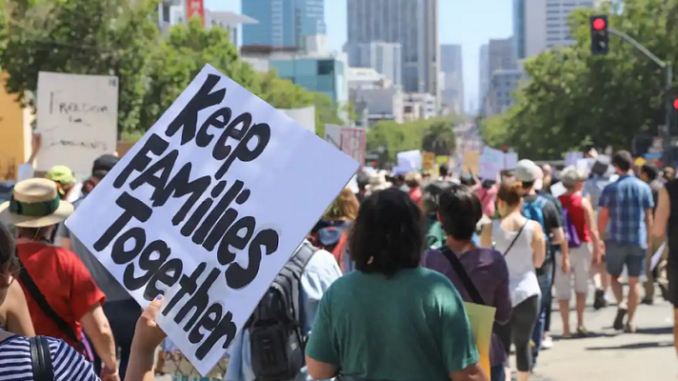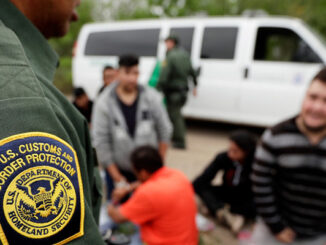
Through a series of executive orders, the president has taken immediate steps to emphasize border enforcement and the deportation of a broad range of immigrants.
By Gabriel R. Sanchez and Adrián A. Pedroza
Although widespread mass deportations across the country—as promised by the Trump campaign—have not yet occurred, Trump has prioritized border enforcement and the deportation of immigrants. Through a series of executive orders, the president has taken immediate steps to emphasize border enforcement and the deportation of a broad range of immigrants. This has included:
- Revoking ICE guidelines established in 2011, which required immigration officers to secure prior authorization before making arrests in designated “sensitive locations,” such as educational institutions, healthcare facilities, and places of worship.
- Expanding expedited deportation procedures for individuals unable to demonstrate continuous presence in the country for over two years.
- Revoking deportation protections for over 300,000 Venezuelans previously granted by the Biden administration prior to its departure from office.
- Terminating birthright citizenship for children born to parents who are either residing in the United States unlawfully or under temporary legal status.
The shift in policy may already be having a pronounced effect not only on the immigrant community but also on Latino families more broadly. According to the 2025 Abriendo Puertas-Opening Doors (AP-OD) and UnidosUS National Latino Family Survey, the majority (57%) of Latino parents and primary caregivers are concerned— including 74% of Latino immigrants who are very concerned—that some of their friends and family members may face deportation.
This ongoing mental health stress has significant consequences for immigrants, particularly children. Research conducted during President Trump’s first term in office raised serious concerns about the long-term health effects on children living in constant fear of a parent’s deportation. These concerns include the damaging impact of toxic stress on early brain development and the physical and mental health throughout child’s lifespan. Researchers have also documented the negative effects of living in an anti-immigrant climate on children’s growth and development, as well as their ability to participate in extracurricular activities in school. Most of these children are U.S. citizens, meaning society will ultimately bear the responsibility of addressing the trauma they have experienced throughout their lives.
One of the biggest concerns researchers have about a deportation-focused climate is its impact on immigrant behavior. Often referred to as the “chilling effect,” several studies have reported a decline in the use of public services during Trump’s first term due to fears among eligible citizens that they could jeopardize their path to citizenship under the administration’s changes to the “public charge rule.” Notably, researchers have found that this chilling effect is not limited to undocumented immigrants. In fact, many U.S. citizens forgo accessing available resources out of fear that their family members could face deportation.
The AP-OD and UnidosUS survey provides early evidence that Latino Americans are already avoiding certain activities in response to Trump’s mass deportation plans. Nearly a third (32%) of Latino parents say they will avoid signing up for public benefits for themselves or their children, including 30% of non-immigrants. This suggests that the chilling effect driven by deportation fears will lead some families to refrain from accessing essential resources they may need to support their well-being.
The impact of deportation fears on interactions with law enforcement is well documented in social science research. Studies, including work by the ACLU and the National Immigrant Women’s Advocacy Project, have examined the experiences of criminal justice professionals—officers, judges, prosecutors, and court staff—across the country. Their findings indicate that arrests in courthouses and a general fear of deportation during Trump’s first term hindered the justice system’s ability to operate fairly and protect public safety. The National Latino Family Survey provides early evidence that these trends are likely to resurface, with 35% of Latino parents surveyed saying they plan to avoid talking to police or reporting crimes.
There is growing concern that the fears of deportation in schools will affect children’s educational development and reduce parental engagement. Educators across the country are already reporting a drop in attendance among immigrant students. The new survey suggests that the shifting immigration climate is also influencing parents and primary caregivers. Just over a quarter (26%) of Latinos surveyed said they are avoiding or will avoid speaking with school officials or teachers, while 30% said they will not enroll their child in school programs or early childhood development programs. The impact of these policy changes extends beyond the immigrant community, as U.S.-born Latinos are more likely than immigrants to avoid both activities.
The consequences of these outcomes will extend far beyond the Trump administration, as the effects on crime, public health, and the education of children from mixed-status families will be felt well into the future. One of the clearest examples is the potential decline in Latino children’s enrollment in early childhood development programs, which have been linked to reductions in economic inequality and greater economic mobility for participants. Since Latino children are already less likely to be enrolled in these programs than their non-Latino peers, any further decline driven by deportation fears poses an even greater risk to their long-term well-being and opportunities.
.
Gabriel R. Sanchez is a senior fellow in Governance Studies at Brookings. Sanchez is a professor of political science and the Founding Robert Wood Johnson Foundation Endowed Chair in Health Policy at the University of New Mexico.



